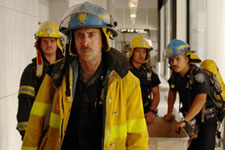By Sarah Barnett
From ancient Greek theatre, through the theatrical productions of the Elizabethan age and into the present, real life tragedy and disaster have played a part in the writing and performing of drama. In modern society the most common expression of such stories is through cinema " a medium associated with escapism and entertainment. Movie making is also a business involving millions of dollars. So is there an ethical dilemma in the turning of real life tragedy into a commercial venture? Is there a moral quandary in making entertainment out of another's suffering?

Nearly five years after the terrorist attacks of September 11, 2001, two films dealing with the incidents of that day have been made. Opening in August is United 93, a documentary-style drama about the plane that crashed into a Pennsylvania field. Directed by Paul Greengrass, this dispassionate account has a cast of unknowns and non actors. In contrast Oliver Stone's World Trade Center, due out in October, has a range of recognisable stars, including Nicholas Cage as a policeman trapped in the wreckage of the two towers.
Apart from a couple of made for television documentaries, these films are the first to touch on the events of that day. And there is considerable wariness about how these movies will treat, what is for some, a sacred day.
For Will Jimeno, one of the two surviving policemen featured in Oliver Stone's film, the pain and anxiety of that day is still fresh. In an interview with the New York Times he admitted that he was uneasy about his ordeal (and 9/11) being made into a film. "We're still nervous. It's still Hollywood."
Reel life dramas
There are hundreds of films that carry the tagline, "based on a true story". Murder, genocide and particularly war are real life events that have been given the big screen treatment. More than 600 movies have been made about WWII alone.
The results are mixed. Some of these explorations of devastation and disaster urge reflection and remembrance. In an article for the Austin American-Statesman journalist John DeFore compared the re-enactment in United 93 with Mel Gibson's Passion of the Christ. Rather than being entertainment of any sort he suggested that engaging with the film offered "a new visceral way of confronting events that defy rational comprehension."
Exploitation or commemoration?
Despite the sensitivity surrounding the events of 9/11 there is a certain inevitability about them becoming the subject of major motion pictures. When it comes to cinema, there is little that is untouchable. BBC News reported in May this year that a Hollywood film studio plans to make a film about the Beslan school massacre in which nearly two hundred children died.
And for an industry that finds inspiration in books, comics, TV and even theme park rides the lure of genuine heartbreak is too strong to resist. After all if most people slow down near car accidents, surely the element of curiosity will entice them to the cinema.
Turning tragedy into ‘entertainment’ is an exercise fraught with moral dilemmas. Filmmakers need to be responsible with the truth and sensitive to the bereaved. As soon as something is “based on real events” audiences tend to believe what they are seeing, even if great liberties have been taken with the truth. Too often history is reworked and reinterpreted for the sake of drama sometimes leaving audiences convinced that what has been seen ought to be believed. In his film Pearl Harbor, director Michael Bay altered the time of the Japanese attack so it could take place against a more interesting backdrop - children playing baseball, women hanging out the washing etc. But this is a minor alteration. Some films change or remove characters, others simplify complex parts of history for the sake of the cinematic drama. The Mel Gibson historical drama, The Patriot, was widely criticised for turning the main character from a racist, bigotted killer into an anti-slavery hero.
There is also the tendency among some filmmakers to sensationalise the events depicted. At the two ends of the spectrum lie Titanic and Hotel Rwanda - both based on real events.
But although there are risks involved in making movies about tragedy, there is also the potential for good to come out of such projects. Perhaps movies about tragedies such as Beslan and 9/11 have a social purpose in reminding us of life's fragility. Perhaps cinema has become the natural place for social commentary and reflection? Perhaps these films are intended to pay tribute to courage and awaken us from our consumerist haze of self-centred living to consider others" even if for just a moment.



















